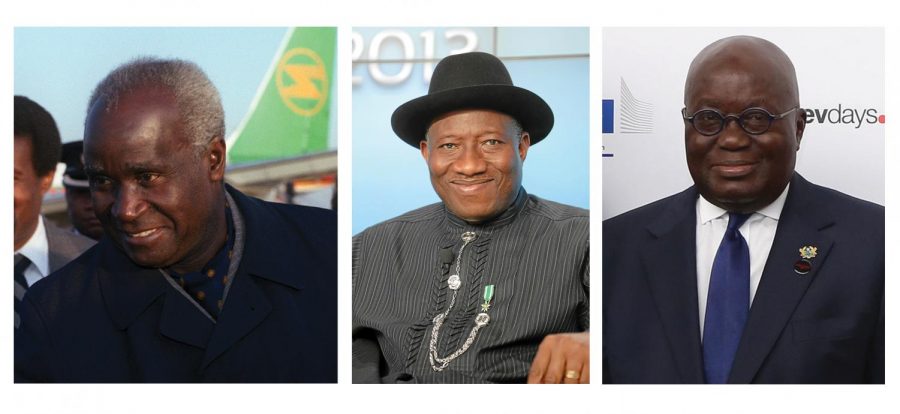EDITORIAL: Sac State shouldn’t break bread with repressive leaders
Persecution of LGBTQ, disabled and the mentally ill not important enough to Nelsen
William M. Firaneck, World Economic Forum and Mission of Norway to the EU – CC BY 2.0 Wikimedia Commons
From left, fromer Zambian President Kenneth Kaunda, former Nigerian President Goodluck Jonathan and current Ghanian President Nana Akufo-Addo have all been invited to give keynote speeches at the Africa Peace Awards annually held at Sacramento State and organized by the University’s Center for African Peace and Conflict Resolution.
April 18, 2018
President Robert Nelsen would probably never invite Donald Trump to Sacramento State to speak at a banquet. But if he did, it would be very hard for campus community leaders to keep silent or shrug it off.
Yet when Nelsen approved the April 28 visit of Ghanaian President Nana Akufo-Addo — who leads a government that arrests people for being gay and shackles mentally ill and disabled people in prayer camps — the response from those on campus who claim to care about marginalized people failed the high-minded idealism they espouse.
RELATED: Ghanaian president invited to Sac State, despite country’s human rights record
In Ghana, gay relationships are illegal. Not gay marriage, mind you — it is illegal for any two people of the same sex to have sex and is punishable with three years in prison per offense.
This isn’t the first time that this particular banquet has invited a speaker noted for his country’s human rights problems, either.
In 2016, former Nigerian President Goodluck Jonathan was invited but didn’t show up to speak at the event because of an illness. In 2014 he signed a law not only prohibiting same-sex marriage, but public support of it as well, according to The Sacramento Bee.
Kenneth Kaunda, the president of Zambia from 1964 to 1991, was the keynote speaker at this same event in 1995. Kaunda led a one-party dictatorship for those decades before eventually allowing an election that led to the removal of his party from power. As for homosexuality, it remains illegal in Zambia under the same law that is used to prohibit bestiality.
LGBTQ people who end up in prison in Ghana are often subjected to sexual and physical abuse, according to a report prepared in-part by the Northwestern University School of Law and a 2012 report from the U.S. Department of State.
More common than imprisonment for gay sex, however, are roving bands who attack people they suspect of being LGBTQ that are rarely followed-up on by police.
The 2012 State Department report tells of about nine men who were “beaten with sticks and canes” for being suspected of being gay and were forced out of their town.
One Ghanaian man, Kwaku Adepa Riche Dallas, was forced to go on the run this year after a group of 30 people stormed the home of the man they believed to be his romantic partner before stripping his clothes and lynching him.
And none of this is to mention the atrocities committed against the disabled and mentally ill in Ghana, or the rampant corruption that Freedom House notes in its most recent report on the country.
While it would be one thing if Akufo-Addo were coming to campus for some legitimate academic purpose — such as a question-and-answer session where students could ask him about his country in a cross-cultural exchange — this is not what the University has in mind, according to the event’s website.
Hearing from people of differing perspectives and opinions should not be an issue at a university — but hosting a repressive leader as your guest of honor at a banquet is a different story.
In having Akufo-Addo come to campus but following up the invitation with a denouncement, Nelsen is trying to have his cake and eat it too.
But make no mistake about it: the fact remains that the persecution of LGBTQ, the mentally ill and disabled people in Ghana is simply not unacceptable enough when it comes to who is invited to be honored at campus dinners.
When asked for its comment, the Sac State PRIDE Center — one of two avenues for representation of LGBTQ students on campus — referred The State Hornet to John Johnson, the director of the Centers for Diversity and Inclusion.
Johnson said the PRIDE Center has “no comment,” though he added that he wants to figure out more about the selection process.
This is unacceptable. Why does the PRIDE Center even exist if it has “no comment” about the leader of a state that allowed, according to the Human Rights Campaign, a roving band of community leaders and police to burn a woman because she was believed to be gay?
Would other marginalized groups be treated this way if the University was throwing a banquet with someone who is involved in their persecution, or are the struggles of LGBTQ people lesser than those faced by other groups?
Perhaps every student — whether from a marginalized community, or not — needs to ask themselves that next time they see a high and mighty SacSend email from Nelsen denouncing “hate” or the latest Trump policy.
At the very least, Akufo-Addo should be made available for questions — while he is here — about the atrocities that go on in his country before he attends the peace dinner.
Perhaps then there will be some value in the visit, rather than just the further marginalization of Sac State’s LGBTQ community.

































































































































Mark Ludwig • Apr 18, 2018 at 3:24 pm
I would like to invite y’all to take my Freedom of Speech class this summer!